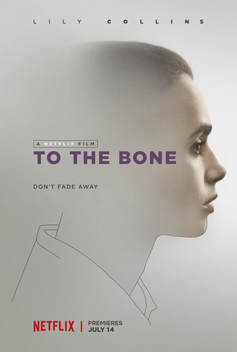 Image via Wikipedia Image via Wikipedia Disclaimer: I wrote these blogs a long time ago! I'm leaving them up as I don't want to delete my journey and I think showing growth is important. But it means that some of my views, and some language I use, is now different. Please be mindful of this, and that the content might be triggering, if you choose to read on. Content warning: eating disorders To The Bone is somehow listed as a 'comedy drama' on IMDB. It's certainly not a comedy. Writer/director Marti Noxon was apparently influenced by her own eating disorder experiences and wanted to help raise awareness of the illness. Whether it does this in the right way is up for debate, and I’m still not entirely sure myself. As much as I’ve had a very weird relationship with food and a rather negative relationship with my body in general, but I’ve not had anorexia so it’s not fair for me to question if the film portrays it well. Though of course it’s also subjective, so To The Bone may have been Noxon’s experience of anorexia but other people may have a very different reality of it. Writing about mental health is tricky, especially for films. From my own experience of learning to write screenplays, it’s all about the three act structure and there’s an expectation to resolve all issues in the final act. This might be something relatively easy to do in a blockbuster action film (there's usually just a big fight and then the guy gets the hot girl) but when there are characters with complex mental health issues it’s hard to realistically resolve these in such a short time. In real life, unpicking trauma can take years. This, for me, was where To The Bone went wrong. There was a lot of focus on the illness (which is always risky as it can end up being a "how to" of eating disorders) and the recovery seemed to be done by way of a rather strange, quite rushed, epiphany sequence. And of course there was a boy involved too…uh oh…. There are only two notable male characters in this film and they hardly speak to each other. Technically you could say it passes the Bechdel test with flying colours. The Bechdel test asks if two women talk to each other about something other than a man, and although this was originally a useful test, it doesn’t stop women being overruled by men in films. In To The Bone, both men talk to her like crap, and their behaviour is never justified as such. It’s a particular gripe of mine when women are saved by men in films, but especially when it involves a mental illness. Often there just is no cure, another reason why it’s so hard to make a film which tells these stories in a satisfying, believable, responsible way. My first screenplay was about a young woman with depression and anxiety, and I’ve spent so long working on the ending to find that balance of it being hopeful but realistic. There are many ways people cope with having a mental illness but meeting someone and falling in love is often not the solution. This only puts pressure on another person to have to ‘fix’ them. Strength comes from inside yourself, not from Prince Charming. This is obviously why I don't write romance! Lilly Collins, who plays Ellen in To The Bone, apparently had an eating disorder herself. It’s no surprise then that she was brilliant in the role, but she did lose weight for it. We can’t say this was a bad choice on her part, because she’s a grown women and is responsible for her own body, but there’s no denying it was a risky move which might have potentially triggered her ED (eating disorder) again. Whilst we’re on the topic of triggers, the film does have calorie counting, weight loss tricks, disordered eating etc, and there are triggering images. We can’t tell people with ED not to watch this film, it’s their choice and many of them will choose to because it’s relevant to them. As with 13 Reasons Why, all Netflix can do is make sure their audience is warned about the content, otherwise the responsibility lies with the audience. We also can’t say these kinds of films and TV shows shouldn’t be made, because otherwise how would we start a dialogue around them? If this film was banned, where would the line be drawn when it comes to other films? On the other hand, there are dangerous images of thin women everywhere. For someone to play an anorexic woman in a film, she needs to be noticeably thinner than other women in films, and the ‘normal’ level is pretty bloody thin. It’s not hard to find ‘thinspiration’ in this world. Some people with anorexia might want to be triggered. You only need to step into the world of ‘pro-ana’ (pro anorexia) websites and thinspiration (sometimes called ‘thinspo’, or even ‘bonespo’) to see that being triggered can be a good thing for them. Ultimately there might be a horrible irony to Lilly Collin’s choice to lose weight for the role in that she may become an unintentional thinspo idol. In short, maybe this film is made for people who don’t know very much about eating disorders. There could be many benefits to parents or teachers, for instance, watching this to help recognise some things that people with anorexia may do. In this sense of raising awareness, maybe it works.  Look, it's Keanu Reeves. Look, it's Keanu Reeves. But let’s talk about Keanu Reeves. Keanu fucking Reeves. Personally, I think he has the screen presence of a lamppost. Apart from in the Bill and Ted films of course. (#NotAllKeanuReevesFilms) But maybe it’s not all his fault in To The Bone. It’s a mix of: a) the annoyingly privileged setting (they clearly got her into that residence ‘cos they’re loaded) b) patriarchal bullshit c) therapists always* being shit in films *Okay, so therapists in films are not all shit (#NotAllTherapists) but they need to be recognised in the script as being shit if they are. Take, for example, Robin Williams in Good Will Hunting. He’s not set up to automatically be the one we should trust because he’s working through his own issues. This works. What doesn’t work is when you get a weird, creepy therapist like Keanu Reeve’s character in To The Bone, who is treated like some kind of cult leader. His behaviour is then validated at the end when she returns to the house, and we’re supposed to believe that it’s a positive outcome for her. It’s great that she chooses to take steps towards her recovery, but to go back to a place run by such a weird creepy bloke is simply bonkers. Keanu/doctor/therapist/perv/cult leader is seen as radical because he says the word ‘fuck’ a few times. ‘Tell those negative thoughts to fuck off’ he says. So insightful and professional. Then he basically tells her to grow up and get over it, she goes away and has her little epiphany and then realises he’s right. The guy who thinks he can cure eating disorders by taking them to dance in some fake rain, is ‘right’ all along. She should’ve reported him, or at least gone to another clinic. But then, the boy was there. Prince Charming. The pompous British twat who came on to her but then instantly body shamed her when she said no. The one who tried to force-feed her chocolate. The one who sat on a tree branch in her epiphany dream – the bit where she was dressed up like some kind of born again Christian angel virgin and he made everything all better by telling her she was pretty. Couldn’t the stepsister have been sitting on that branch with her, Ellen wearing her usual clothes? Can she not take steps to recovery without there being a man there to help, and without having to wear less eyeliner? Then there was the mother and the moon. That strange, inappropriate feeding bit where her mother cradled her like a baby. I can see the theory behind that and it was nice to have a slight resolution to their seemingly turbulent relationship, but…really? And the moon…God knows. For a character who didn’t seem remotely spiritual, this ending was a little bit of a stretch for me. But the point is, she reaches the stage where she decides to follow the path to recovery. The intentions are good overall, and above all it’s a dialogue opener. The strength of the film was certainly in it’s strong female characters and family dynamic, showing how eating disorders effect the whole family. I hope this movie helps people learn a little more about an under-represented topic in film and will open conversations about eating disorders and how we can help people and families affected. If you or someone you know is affected by an eating disorder, here are some recommended websites: https://firststepsed.co.uk/firststepsed.co.uk/ https://www.b-eat.co.uk/ A note about triggering FEELING TRIGGERED IS NOT A WEAKNESS. If you’re the sort of person who mocks people for being triggered by things they watch or read, or uses the term ‘snowflakes’, you need to take a serious look at what kind of person you are. You wouldn’t laugh if that person was a relapsed drug addict, or if somebody had an injury which flared up. It proves how we don’t take mental health seriously enough as a society. Many people have had difficult experiences in their lives which can be easily triggered, bringing up difficult emotions. If you’re lucky enough not to have this problem then please recognise that not everyone is the same. It is not cool to laugh at somebody who is upset about something. It shows a lack of empathy, and that frankly you’re just a d*ck. Be excellent to each other!
0 Comments
Leave a Reply. |
Categories
All
Archives
June 2024
|
